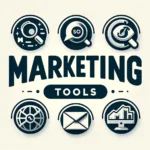
A Guide to Fundamental Marketing Tools for Businesses
What are marketing tools? At Opvital, we’re dedicated to shedding light on these essential tools, providing insights for those embarking on the journey of utilizing them effectively. Whether you’re a budding entrepreneur, a seasoned marketer, or just beginning to explore the realm of digital marketing, this guide is tailored to help you comprehend and make the most of them.
Key Takeaways:
| Key Takeaway | Description | Importance for Businesses |
|---|---|---|
| Diverse Range of Tools | Marketing tools encompass a wide range from SEO and content creation to CRM and data analytics. | Enables businesses to address various aspects of digital marketing effectively. |
| Strategic Integration | Effective use of marketing tools involves integrating them into a cohesive strategy. | Ensures that different tools work synergistically for maximum impact. |
| Customization and Flexibility | Tailoring tool choices to specific business needs and staying adaptable to changes. | Allows businesses to maintain relevance and effectiveness in their marketing efforts. |
| Data-Driven Decisions | Utilizing tools for analytics and data analysis to inform marketing strategies. | Empowers businesses to make informed decisions based on market and customer insights. |
| Automation for Efficiency | Leveraging automation tools to streamline marketing processes and save time. | Increases efficiency, allowing businesses to focus on strategy and innovation. |
| Budget Considerations | Selecting tools that align with budget constraints, especially for small businesses. | Ensures cost-effectiveness while still achieving marketing objectives. |
| Content is King | Prioritizing high-quality content creation to engage and attract customers. | Strengthens brand identity and improves customer engagement and SEO. |
| Customer-Centric Approach | Using CRM and personalization tools to enhance customer experiences. | Builds stronger relationships and loyalty with customers. |
| Keeping Up with Trends | Staying updated with the latest developments in marketing tools and strategies. | Keeps businesses competitive and innovative in a rapidly evolving digital landscape. |
| Measuring ROI | Assessing the return on investment for marketing tools to evaluate effectiveness. | Helps in justifying marketing spend and adjusting strategies for better results. |
Understanding Marketing Tools and types
The Role of Marketing Tools in Business Success
Marketing tools are not just software or applications; they are pivotal in propelling your brand to new heights. Ranging from digital content creation platforms to data analytics software, these tools are central to modern marketing strategies. In a world where digital reigns supreme, comprehending the intricacies of what marketing tools are is not just advantageous; it’s imperative.
The Evolution of Marketing Tools
The shift from traditional methods to advanced digital techniques signifies that businesses now have a plethora of tools at their disposal, targeting various facets of marketing, from customer engagement to data-driven decision-making.
Website and SEO Tools
The Necessity of a Well-Designed Website
Your website is often the initial contact point between your business and potential customers. A well-designed website should be visually appealing, user-friendly, and optimized for search engines.
Introduction to SEO Tools
Search Engine Optimization (SEO) is pivotal for enhancing your website’s visibility on search engines like Google. SEO tools offer insights into keywords, backlinks, and competitor analysis, essential for crafting strategies that elevate your website’s ranking. Some viable options include Ahrefs, Semrush, and Moz.
Social Media Management Tools

Tools such as Hootsuite, Buffer, and Sprout Social allow businesses to manage posts, track engagement, and analyze social media performance.
Selecting the right social media management tool is crucial for streamlining your marketing efforts and maximizing your online presence. Here are some tips to help you choose the most appropriate tool for your business needs:
- Platform Support: Ensure that the tool supports all the social media platforms you use. Some tools may offer comprehensive solutions for platforms like Facebook, Twitter, Instagram, LinkedIn, and more, while others might specialize in just one or two. Choose a tool that covers all your bases.
- Analytics Capabilities: A good social media management tool should provide robust analytics that helps you understand your audience, determine the best times to post, track engagement metrics, and measure the performance of your content. Look for tools that offer detailed reports and real-time analytics.
- Budget: Social media management tools come in a range of prices, from free basic plans to more costly ones with advanced features.
- Usability: The tool should be user-friendly and require minimal training to use effectively. A complicated tool could end up consuming more time than it saves. Many tools offer a free trial period, so take advantage of this to test the tool’s usability.
- Integration: Consider how well the tool integrates with other software you are using, such as your CRM system or email marketing platform. Seamless integration can significantly improve workflow and data consistency.
- Automation: Look for a tool that allows you to schedule posts in advance, automate responses to common questions, and streamline your content strategy.
Email Marketing Tools

Relevance of Email Marketing
Email marketing remains a potent tool in terms of direct customer engagement. It allows personalized communication with your audience, adding a human touch to digital interactions.
Features of Effective Email Tools
An effective email marketing tool should offer features like customizable templates and automated campaign capabilities.
| Feature | Description |
|---|---|
| Mobile Optimization | Emails should be readable on mobile devices, as a significant portion of users access their email through mobile applications. |
| Scalable Pricing | Flexible subscription tiers should be available, making it easy to upgrade as the organization grows. |
| Robust Analytics | The tool should provide detailed reports on key metrics and support A/B and multivariate testing. |
| Third-party Integrations | Compatibility with other apps and services for seamless workflow integration. |
| Customer Service | Responsive support, preferably with immediate assistance options like live chat. |
| Marketing Automation | Automated email sequences for various customer actions, with a user-friendly interface. |
| Email Surveys | Facilities to create and send surveys easily for customer feedback. |
| Suitable Message Limits | A sufficient number of messages per month to accommodate the size of the subscriber list. |
| Spam Testing | Tools to check emails against spam filters to ensure they reach the inbox. |
Content Creation Tools
Importance of Quality Content in Digital Marketing
In digital marketing, quality content is king. It’s not just about conveying information; it’s about engaging your audience and building your brand’s identity. Here, we’ll explore tools that aid in creating compelling content.
Tools for Engaging, High-Quality Content Creation
Tools like Adobe Creative Suite for graphic design, Canva for easy visuals, and video editing like Final Cut Pro highlight utility in content creation. They streamline the creation of blog posts, videos, infographics, and social media content.
Furthermore, these tools play a crucial role in multiple aspects of marketing. Let’s delve into their importance:
| Aspect | Importance in Digital Marketing |
|---|---|
| Strategic Planning | Facilitates content brainstorming, scheduling, and organization to align with marketing goals. |
| Content Consistency | Ensures uniformity in tone, style, and delivery across various channels for brand recognition and trust. |
| Audience Targeting | Utilizes CRM and analytics for data-driven personalization and targeting, improving content relevance. |
| Efficiency & Time Saving | Automates repetitive tasks, freeing up resources for creative and strategic work. |
| Performance Analytics | Provides insights on content performance, guiding strategy refinement and audience engagement. |
| SEO Optimization | Enhances content discoverability and search engine ranking through keyword and SEO factor analysis. |
| Collaboration | Supports team communication and collaboration, ensuring cohesive content strategies across different locations. |
Analytics and Data Analysis Tools
Role of Data in Measuring Marketing Effectiveness
Data analytics lie at the core of understanding the importance of these instruments for measuring and enhancing the effectiveness of your marketing efforts. They offer insights into customer behavior and campaign performance.

Tracking, Analyzing, and Interpreting Marketing Data
Data analytics tools help track website traffic, understand customer demographics, and measure campaign success. Here’s in-depth of how they do so:
| Data Type | Usage | Action |
|---|---|---|
| Audience Insights | Understand demographics, behaviors, preferences. | Tailor content, targeting, messaging to align with audience needs. |
| Engagement Metrics | Analyze click-through rates, social interactions. | Adjust content formats and distribution channels for engagement. |
| Conversion Tracking | Track marketing efforts leading to sales. | Focus on high-performing strategies and channels. |
| Customer Feedback | Gather surveys, reviews, social listening data. | Improve products/services, address concerns. |
| SEO Analytics | Monitor keyword performance, search rankings. | Optimize for search visibility and user experience. |
| Competitive Analysis | Benchmark against competitors. | Identify market gaps and opportunities for differentiation. |
| Email Campaign Data | Analyze open rates, click rates, post-click behavior. | Refine email content, layout, targeting for engagement. |
| Website User Behavior | Use heatmaps, session recordings. | Enhance website design and user experience. |
| Social Media Analytics | Assess content performance, follower growth. | Develop resonating content, foster community growth. |
| Ad Performance Metrics | Evaluate effectiveness of ads. | Optimize ad copy, targeting, budget for better ROI. |
Customer Relationship Management (CRM) Tools
Understanding CRM in Marketing
CRM tools are essential in illustrating what are marketing tools for managing customer relationships. They help manage interactions with customers, streamline processes, and improve business profitability

List of CRM Tools and Their Benefits
In terms of how CRM tools personalize a lead’s experience through the sales funnel, here are some of the aspects and key points to take away.
| CRM Feature | Function | Impact on Personalization |
|---|---|---|
| Data Collection | Gathers customer demographics, purchase history, interactions. | Segments customers for targeted campaigns. |
| Targeted Communication | Sends personalized communications based on customer data. | Enhances relevance of campaigns to individual preferences. |
| Behavior Tracking | Monitors interactions with digital touchpoints. | Personalizes future interactions and predicts needs. |
| Customer Feedback | Manages customer surveys and feedback. | Adjusts products and services to better suit customer preferences. |
| Sales Automation | Automates outreach based on customer actions. | Delivers timely communication relevant to the customer’s journey. |
| Analytics and Reporting | Analyzes purchasing patterns and preferences. | Refines marketing strategies with data-driven insights. |
| Tool Integration | Syncs with other marketing tools. | Ensures consistent personalization across channels. |
| AI and Machine Learning | Predicts behavior and personalizes interactions. | Provides scalable and highly relevant content recommendations. |
Explore tools like Salesforce, Zoho CRM, and HubSpot CRM to get started with CRM Software!
Automation and Integration Tools
Concept of Marketing Automation
Automation tools exemplify what marketing tools are by enhancing efficiency and effectiveness in marketing. They automate repetitive tasks, allowing businesses to focus on strategic and creative aspects.
Tools That Simplify Marketing Processes
Marketing automation tools like Marketo, Eloqua, and Mailchimp are powerful platforms that streamline various marketing tasks, making them essential for modern marketers. Each tool has unique features, but they share common functionalities that enhance marketing efforts.
| Feature | Marketo | Eloqua | Mailchimp |
| Primary Strength | Lead Management and Nurturing | Advanced Segmentation and Targeting | User-Friendly Interface, Ideal for Small to Medium-Sized Businesses |
| Lead Tracking & Scoring | Excellent, scores leads based on interactions with content | NA | NA |
| Personalized Email Marketing | Personalized campaigns based on customer behavior and preferences | NA | Scheduling of email campaigns, automated responses based on customer actions |
| Campaign Management | Tailored for complex, multi-step campaigns | Highly sophisticated for complex, multi-step marketing campaigns | Simple yet effective tools for email campaigns, social media ads, landing pages |
| Integration with Marketing Platforms | Integrates with various platforms for a cohesive strategy | Integrates seamlessly with various platforms | Easy integration with various marketing platforms |
| Automation Capabilities | Automates a wide range of tasks, including email and lead scoring | Automates complex campaigns based on user behavior or schedules | Automates tasks like email campaigns and social media posts |
| Target User Base | Suitable for businesses with a focus on lead generation and nurturing | Ideal for businesses needing detailed customer profiling and targeting | Great for small to medium businesses starting with automation |
Benefits of Automation
Efficiency Benefits
- Time-Saving: Automation tools handle repetitive tasks such as sending emails, posting on social media, and segmenting customers. This frees up valuable time for marketers to focus on more strategic and creative tasks.
- Scalability: These tools enable businesses to scale their marketing efforts without a corresponding increase in workload or resources. For instance, the same effort is used to send an email to 100 or 10,000 subscribers.
- Improved Lead Management: By automating lead nurturing processes, businesses can ensure timely follow-ups and engagement with prospects. This systematic approach can lead to a higher conversion rate.
- Data-Driven Decision Making: Automation tools provide comprehensive analytics and reporting features. Marketers can track campaign performance in real-time, allowing for quick adjustments and more informed decision-making.
- Cost Reduction: By streamlining marketing processes and reducing the need for manual labor, these tools can lead to significant cost savings over time.
Consistency Benefits
- Brand Consistency: Automation ensures that all marketing messages and materials are consistent in terms of tone, style, and branding. This uniformity helps in building a stronger brand identity.
- Regular Customer Engagement: With automation, businesses can maintain regular contact with their customers through scheduled emails, social media posts, and other marketing activities, enhancing customer relationships.
- Error Reduction: Manual processes are prone to errors. Automation reduces the likelihood of mistakes, ensuring that campaigns are executed flawlessly.
- Uniform Customer Experience: Regardless of the customer’s stage in the buying journey, automation tools can provide a consistent and personalized experience, which is critical for customer satisfaction and loyalty.
- Compliance and Governance: Automation tools can help in ensuring compliance with various marketing laws and regulations, like GDPR, by maintaining consistent standards in data handling and communications.
Recap
In concluding our comprehensive guide to fundamental marketing tools for businesses, it’s essential to reiterate the importance of strategic integration. The digital marketing landscape offers a plethora of tools, each with unique functionalities and benefits. However, the true power lies not in individual tools but in how effectively they are integrated into a cohesive marketing strategy.
- Strategic Integration: The integration of various tools – from content creation and SEO to analytics and CRM – allows for a streamlined and effective marketing approach. This synergy is critical in ensuring that each tool complements the others, thereby maximizing their collective impact.
- Customized Approach: Each business has unique needs and goals. It’s crucial to remember that there’s no one-size-fits-all solution in digital marketing. What works for one business might not be the best fit for another. Experimenting with different tools and configurations is key to discovering what aligns best with your specific business objectives and target audience.
- Adaptation and Flexibility: The digital marketing world is ever-evolving, with new tools and technologies emerging regularly. Staying adaptable, keeping an eye on emerging trends, and being willing to adjust your strategies accordingly are important for maintaining a competitive edge.
- Continuous Learning and Improvement: Lastly, the journey with marketing tools is one of continuous learning and improvement. Regularly reviewing the performance of your tools, seeking feedback, and making data-driven adjustments will ensure that your marketing strategy remains effective and relevant.
By embracing these principles, businesses can leverage the full potential of marketing tools to create impactful, efficient, and successful marketing campaigns. As you explore the vast array of tools available, let this guide serve as a roadmap to inform your choices and strategies. At Opvital, our commitment is to empower you with the knowledge and resources needed to navigate the dynamic landscape of digital marketing successfully.
FAQs
Marketing tools are designed with adaptability in mind. They often include features that allow businesses to quickly respond to changing market trends. This includes real-time data analytics, agile content creation tools, and adaptable campaign management features.
Absolutely. Many marketing tools are scalable and offer affordable plans, making them accessible to small businesses. By using these tools strategically, small businesses can effectively compete with larger ones, especially in targeting niche markets and building strong customer relationships.
AI and machine learning are increasingly integral to marketing tools, offering advanced capabilities like predictive analytics, customer behavior analysis, and automated personalization of marketing messages. These technologies help in making more informed decisions and enhancing the effectiveness of marketing strategies.
ROI can be measured through various metrics provided by these tools, such as conversion rates, customer acquisition costs, and overall campaign performance. Aligning these metrics with business objectives provides a clear picture of the return on investment.
Read More
Trying to figure out if digital marketing is for you? Check our our Digital Marketing Bootcamp Analysis!
For more insights check out our review on content writers like Neuronwriter!
- Digital Marketing Tools: The Importance of Marketing Tools
 The Importance of Marketing Tools In today’s digital landscape, businesses …
The Importance of Marketing Tools In today’s digital landscape, businesses …Digital Marketing Tools: The Importance of Marketing Tools Read More »
- A Guide to Fundamental Marketing Tools for Businesses
 What are marketing tools? At Opvital, we’re dedicated to shedding …
What are marketing tools? At Opvital, we’re dedicated to shedding …A Guide to Fundamental Marketing Tools for Businesses Read More »
- The Significance of Marketing Tools
 Key Takeaways for Marketing Tools Marketing Tools Overview – Diverse …
Key Takeaways for Marketing Tools Marketing Tools Overview – Diverse … - A Comprehensive NeuronWriter Review: Unveiling Its SEO Powers
 Welcome to Opvital’s in depth NeuronWriter Review. NeuronWriter is more …
Welcome to Opvital’s in depth NeuronWriter Review. NeuronWriter is more …A Comprehensive NeuronWriter Review: Unveiling Its SEO Powers Read More »
